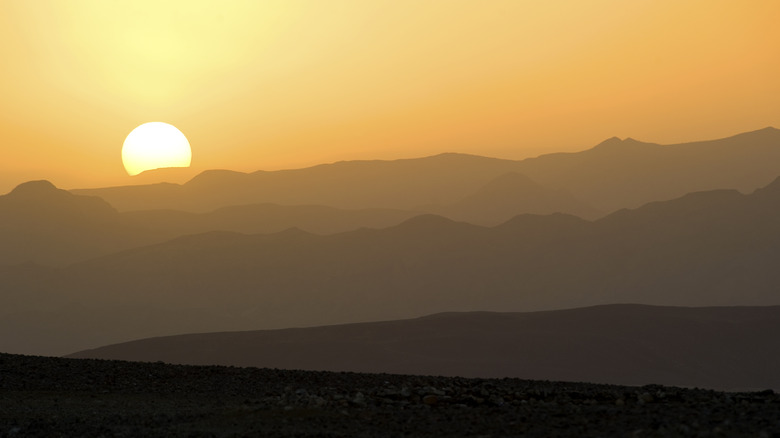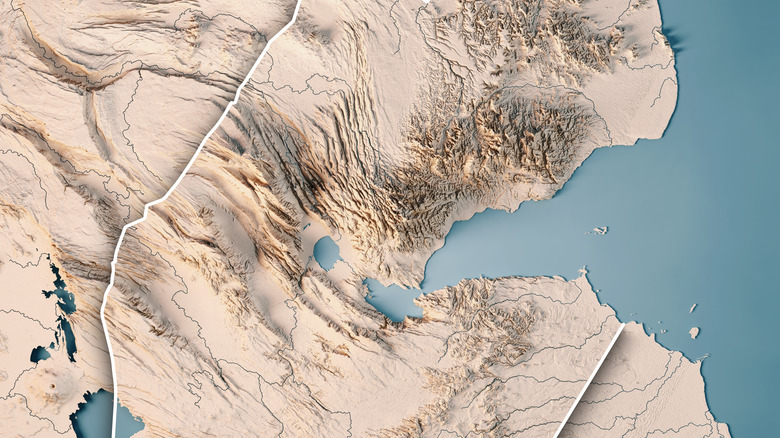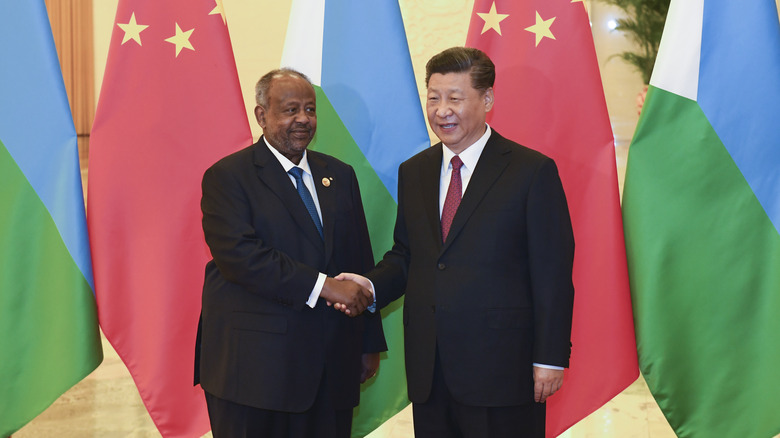Why Djibouti Has So Many Foreign Military Bases
Djibouti is one of those countries that, unless you're well-versed in a certain type of history, you might have never heard of. Located on the eastern coast of the African continent near the Middle East, it's very easy to overlook Djibouti in favor of its larger, more well-known neighbors like Ethiopia, Somalia, and Yemen and Saudi Arabia across the Red Sea. As the United Nations says, Djibouti is about the size of New Jersey and has a population of less than 1 million. Much like other countries in the region, its tribal history is incredibly long and intermingles much more freely with nearby peoples than its modern, colonially-defined borders describes. Djibouti only gained independence from France in 1977 but retains its incredible political and military prominence because of its location: gatekeeper to the Horn of Africa and entire Indian Ocean.
Djibouti's geographic importance is so critical, in fact, that it was recognized by ancient Egypt as far back as its Early Dynastic Period (3150 to 2613 B.C.E.), as World History Encyclopedia explains. Back then Egyptians referred to the region around Djibouti as the land of Punt. The waters leading south to Punt from the Suez Canal and the Mediterranean Sea were critical for bridging the gap from Egypt to the Indian Ocean. Whoever controlled Punt controlled trade and water routes, especially to Mesopotamia. This is exactly why modern countries, even now in the present, continue to use Djibouti in vies for dominance.
Of critical military importance
At present, Djibouti is a comparatively stable democratic republic with free elections. But as the BBC outlines, it took all the way from its independence in 1977 to 2003 to do so. In 2003 the U.S. also established its military base, Camp Lemonnier, in the country. The timing of the decision was non-coincidental, as it followed on the heels of the 9/11 terrorist attacks against the World Trade Center. To this day Camp Lemmonier is the United States' only military base on the entire African continent.
France might have gotten there before the U.S., but staunch U.S. ally Japan opened its own military base — it's only international military base, it should be noted — in Djibouti in 2011. Italy followed suit in 2012, and then China in 2017. Saudi Arabia also has a military presence in the region, as well as Germany, Spain, and the Netherlands. The U.K. and Turkey are militarily active in Djibouti, too. To add to the dogpile, Russia and India are reportedly considering opening their own Djibouti military bases. All foreign military bases in Djibouti, it should be noted, are leased from the Djibouti government like tenets from a landlord. Deutsche Welle estimates that military base contracts yield the Djibouti government about $120 million annually. In 2015, per the BBC, the U.S. renewed its lease for 10 more years.
A murky political future
At this point Djibouti is strategically important not only for its location, but as a tool of competition between international superpowers. China, in particular, has leveraged Djibouti for commercial and military expansion, as Euractiv summarizes. U.S. politician John Kerry called the move "worrisome," per the BBC. On the surface, China is interested in overseeing its $200 billion per year in regional trade, but Asia Times points out that things are not so simple. Djibouti gets rent from China for China's military base, but Djibouti has also taken out a $4 billion loan from China to help its build up its infrastructure. Some worry that this will strengthen China's influence over the area, especially if Djibouti becomes unable to repay its loans due to political instability.
Djibouti has been considered one of the more stable governments in the area, in part because it lacks a fundamentalist Islamic group stirring up trouble, per Asia Times. But since 2011, sociopolitical conditions in the country have gotten less clear. Djibouti President Ismail Omar Guelleh (pictured above with Chinese President Xi Jinping), for instance, has extended presidential rule from two to three terms — a move that calls his country's democracy into question. Meanwhile, Asia Times says that Guelleh's regime masks "authoritarian state machinery and strict libel laws" that have all but censored media outlets and muddied the true inner state of the nation. Such complications all but ensure that Djibouti will stay strategically critical for quite some time to come.


